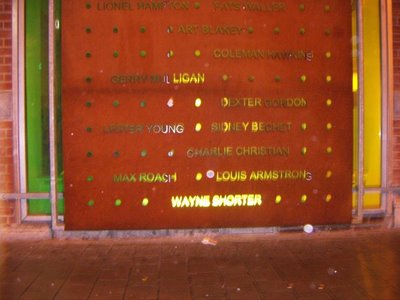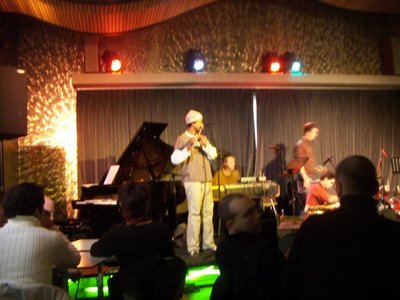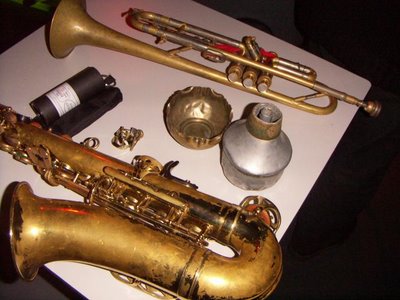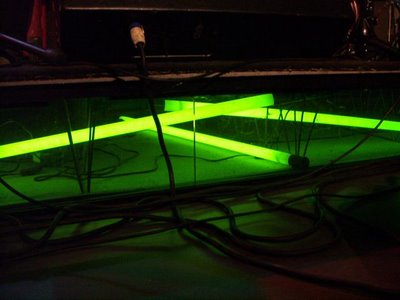Octurn - 02/12/2006@Jazz Station, Brussels

Bo Van Der Werf - bs (website)
Guillaume Orti - as
Laurent Blondiau - tp, flh
Magic Malik - fl, voc
Fabian Fiorini - p
Jozef Dumoulin - fender
Jean-Luc Lehr - el b (MySpace)
Chander Sardjoe - d
(See also: September 2006 concert review and perhaps a forthcoming mega-post that I've been working on for the longest time...)
This is the fourth time I've seen them this year and each time has been better than the last. One thing is becoming increasingly clear: the influence of Malik.
It is my personal assessment that two "external" musicians have deeply altered the course of Octurn's history. The first was trombonist Geoffroy De Masure, who is no longer a member. 6 years ago, on Round, his "Round-Miroir" ushered in the more overt European-take-on-Steve Coleman sound that would become central to the band for the next 4-5 years. The second is Malik.
Magic Malik is also a Coleman disciple (he is on Weaving Symbolics and Coleman is on some of the flutist's albums), but he brings a lightness of touch and soft-focus intensity that has totally eliminated the overly-cerebral and bombastic elements that had taken root in Octurn. Whereas at one time there had been an insistent, almost independent, math-funk groove underneath a lumbering orchestral mass, now there's a lot more looseness and dreamy drift. The music is also more collective and unified and the relationships between instruments has gained in clarity. I'm looking forward to the recordings made in September being released.
The very long first piece was a sort of 30-35 minute medley of Malik compositions. Initially the musicians floated around a textural core that managed not to lose its character. I wondered how the music was organised: the structure seemed porous and slow to unfold, yet there were several very precise shifts. One of Malik's great contributions was to plot surprisingly melodic, hooky and simple horn motifs through complex harmonies, thereby offseting the complexity of the odd-metered bass vamps, dissonant voicings and group interaction, or, inversely, to overlay an apparently straight-forward beat with a bass-and-voice line in a different meter, to funky effect. As the volume subsided after one climax, a quasi-pastoral front-line motif was revealed and I couldn't help but think of the contemporary American big bands I've listening to over the last few days (John Hollenbeck's, Maria Schneider's and Darcy's).
When Chander Sardjoe kickstarted the music with a light-footed and lop-sided drum'n'bass beat, the ongoing motif was reshaped into something faster and more percussive. Laurent Blondiau then used his plunger to play off the saxophone section, in a way that tapped totally unexpectedly into Ellington.
While there were occasional out-and-out solo + accompaniment moments throughout the concert, only one piece, Bo Van Der Werf's "Calcutta" was completely based on that form. Otherwise, it was mostly an is-it-improvised-or-composed circulation bewteen brilliant piano interludes, improvised duets, unhurried grooves and massive ensembles. This left a lot of room for the unexpected. The last piece of the second set mutated from gentle horns being intermittently undercut by the fuzzy rock energy of a complex, stabbing rhythm section pattern to a slow and loose dub lilt, which Guillaume Orti and Blondiau suddenly played a quasi-fanfare riff over, at an unrelated, faster tempo. The joy here was in hanging on while the whole thing seemed on the very brink of falling apart.
I don't know if full disclosure is necessary on a blog, but after the concert, the band invited me to dine with them. The Italian food and spicy conversation had no effect on my opinion of this fantastic concert, though.
I was very happy to make the acquaintance Raoul and his wife. Raoul is one of those old guys whose amazing life story you instantly envy. In 1966, aged 27, he left the comforts of the Belgian bourgeoisie to attend the first Festival Mondial des Arts Nègres in Dakar and ended up staying in Sénégal for 20 years. Rejected by the Euro-expat society, he bonded deeply with the Senegalese. He also travelled in the Carribbean and met Aimé Césaire and his peers, studied their work and spoke passionately of its impact, the scale of which he finds still under-recognised.
An architect, in 1963 he designed a set used at the Olympia behind John Coltrane's Quartet, then went to the restaurant with him. An elderly Dizzy Gillespie stayed at his Senegalese home. Stan Getz celebrated his 53rd birthday there. He's been following jazz since the 1950s and is still totally enthralled with its latest evolutions, 50 years later. How many people can you say that of? He loved Octurn's concert, too.
|